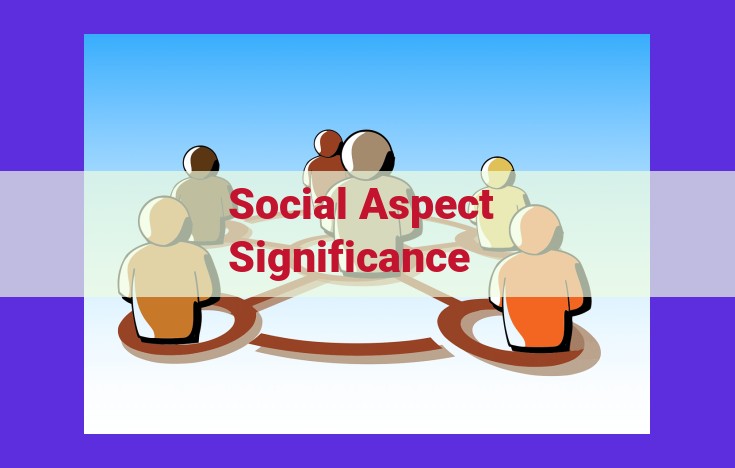Social aspect significance encompasses various factors that contribute to societal well-being, including social capital (trust, cohesion, networks), social trust, social cohesion, social networks, social norms, social support, social exchange, social identity, and addressing social inequality. These aspects impact health, economy, crime, civic engagement, self-esteem, and group dynamics.
The Foundation of Social Well-being: Social Capital
What is Social Capital?
Social capital is a reservoir of valuable relationships and resources that exist within a community or society. It encompasses trust, cohesion, networks, norms, support, exchange, and identity. These elements work together to create a strong social fabric that supports the well-being of individuals and communities alike.
The Importance of Social Capital
Social capital has far-reaching impacts on various aspects of life. It contributes to:
- Improved Health: Strong social connections provide emotional support, reduce stress, and promote healthy behaviors.
- Economic Prosperity: Trust and cooperation among individuals facilitate business transactions, innovation, and economic growth.
- Reduced Crime: Social cohesion fosters a sense of shared responsibility and community surveillance, deterring criminal activity.
- Enhanced Civic Engagement: Social capital empowers individuals to participate in their communities, making them more politically active and engaged citizens.
Key Elements of Social Capital
- Trust: A belief in the honesty, reliability, and fairness of others.
- Cohesion: A sense of unity, belonging, and shared values among individuals.
- Networks: The interconnected web of relationships that connect individuals within a community.
- Norms: Shared expectations for behavior, which provide guidance and promote social order.
- Support: Emotional, practical, and financial assistance provided by others.
- Exchange: Reciprocal interactions based on the principle of giving and receiving.
- Identity: A sense of self that is shaped by social interactions and group membership.
The Bedrock of Social Order: Exploring the Power of Social Trust
Social trust is the glue that binds communities together and fosters a sense of collective well-being. It’s the belief that others are generally trustworthy and have good intentions, allowing us to interact with strangers without fear. This trust is vital to building cooperative and cohesive communities.
Numerous factors influence social trust. Norms and institutions shape our expectations of how others will behave. Positive experiences with others can also increase trust, while negative ones can erode it. Trust is a delicate balance that requires consistent nurturing and reinforcement.
The consequences of social trust are far-reaching. It enhances our well-being by reducing stress and promoting a sense of belonging. It also leads to lower crime rates as people are less likely to engage in antisocial behavior when they trust others. Finally, economic growth thrives on trust as it facilitates cooperation, reduces transaction costs, and attracts investment.
Trust is not a passive concept; it must be actively cultivated. This means being open to others, taking risks, and forgiving mistakes. It also means holding ourselves and others accountable for our actions. By embracing these principles, we can create a society where trust Flourishes** and communities thrive.
Exploring Social Cohesion: The Strength of Community Ties
Social cohesion, the glue that holds communities together, plays a pivotal role in fostering harmony and cooperation. It is the invisible bond that connects individuals, creating a sense of belonging and shared purpose.
Building Social Cohesion
Building social cohesion requires active participation from all members of the community. Civic engagement, such as volunteering or attending community events, provides opportunities for individuals to interact and forge connections. Regular interaction strengthens relationships and builds trust, the foundation of social cohesion.
Community Organizations: A Catalyst for Togetherness
Community organizations, like neighborhood associations or youth groups, serve as hubs for social interaction. They provide a structured environment for people to come together, share ideas, and work towards common goals. These organizations foster a sense of collective ownership and responsibility, strengthening the bonds within the community.
Benefits of Social Cohesion
The benefits of social cohesion are far-reaching. Reduced isolation is one of its primary impacts. When people feel connected to others, they are less likely to experience loneliness or alienation. Increased participation is another advantage. Social cohesion encourages individuals to actively participate in community affairs, contributing their skills and perspectives to the betterment of their surroundings.
Moreover, social cohesion promotes community resilience. In times of crisis or hardship, communities with strong social bonds are better equipped to support and recover together. Individuals are more likely to lend a helping hand, share resources, and work collectively towards solutions.
The Role of Social Networks: Connecting Individuals for Support
Social networks serve as the backbone of our lives, intertwining us with family, friends, and countless connections both online and offline. These networks are crucial for our well-being, bolstering our social capital and providing us with essential resources.
Types of Social Networks
- Family and Friends: The closest social network, providing unconditional support and a sense of belonging.
- Groups and Organizations: Communities based on shared interests or goals, offering opportunities for connection and personal growth.
- Online Communities: Virtual networks that transcend geographical boundaries, connecting individuals with similar passions or experiences.
Benefits of Social Networks
Social networks enhance our lives in numerous ways:
- Increased Social Capital: Networks expand access to resources and social support, fostering trust and strengthening communities.
- Access to Resources: Through connections, individuals gain knowledge, skills, and opportunities that may not be readily available otherwise.
- Sense of Belonging: Social networks provide a sense of community and acceptance, reducing isolation and boosting self-esteem.
In conclusion, social networks play an indispensable role in our lives. They connect us with others, empower us with resources, and create a sense of belonging. Nurturing these networks is essential for our well-being, both as individuals and as a society.
Adhering to Social Norms: The Unwritten Rules of Society
Imagine entering a room filled with strangers. How do you know how to behave? You look around and observe others, following the unspoken cues that guide their actions. These are social norms, the unwritten rules that shape our interactions and maintain social order.
Defining Social Norms
Social norms are shared expectations about how we should behave in different situations. They govern everything from table manners to traffic laws, creating a framework that helps us navigate social interactions without chaos. These norms may vary across cultures and communities but serve the same essential purpose: to ensure the smooth functioning of society.
Types of Social Norms
There are three main types of social norms:
- Folkways: Unwritten customs that guide everyday behavior, such as shaking hands or avoiding eye contact in certain situations.
- Mores: Stronger norms that carry moral weight, such as honesty and respect for others.
- Laws: Formal norms enforced by the government with specific punishments for violations.
Impact on Behavior and Society
Social norms play a crucial role in shaping our behavior and preventing conflicts. By following them, we:
- Maintain Predictability: We know what to expect from others, reducing uncertainty and anxiety.
- Prevent Conflict: Norms discourage disruptive behaviors and promote cooperation, minimizing potential disputes.
- Foster Social Cohesion: Shared norms create a sense of belonging and共同體, fostering a harmonious and well-functioning society.
Adhering to social norms is essential for maintaining a stable and orderly society. It allows us to engage with others respectfully, build trust, and create a positive social environment. Understanding and respecting these unwritten rules is crucial for both individuals and communities to thrive.
The Power of Social Support: Nurturing Emotional Well-being
In the tapestry of life, social support emerges as an indispensable thread, weaving together a vibrant web that sustains our emotional well-being. It is the strength we draw from our connections, the comfort we find in the presence of caring others.
Social support encompasses a broad spectrum of interactions, from the warmth of family and friends to the professional guidance of healthcare professionals. These sources of support provide a haven where we can share our joys, soothe our sorrows, and find solace in the face of adversity.
The benefits of social support are profound. Studies have shown that people with strong social networks experience reduced anxiety, improved physical health, and increased resilience. Social support acts as a buffer against stress, helping us to navigate life’s challenges with greater fortitude.
When we share our burdens with trusted individuals, we not only receive emotional comfort but also gain perspective and valuable advice. This shared experience strengthens our bonds and deepens our sense of belonging. Furthermore, social support fosters a sense of social capital, reinforcing our connections within the community and creating a network of reciprocal trust and support.
In a world often characterized by isolation and loneliness, social support serves as a lifeline, connecting us to others and nurturing our emotional well-being. It is through these meaningful relationships that we discover our true strength and thrive in the tapestry of life.
Social Exchange: The Reciprocal Flow of Resources
In the realm of human interactions, social exchange plays a pivotal role in shaping our relationships and the fabric of society. It’s a fundamental principle that governs the exchange of resources, both tangible and intangible, between individuals or groups.
Central to social exchange is the concept of reciprocity. Simply put, when we receive something from someone, we’re inclined to return the favor or feel indebted to them. This innate drive drives us to maintain balance in our relationships and encourages cooperation.
There are various types of social exchange, each with its unique characteristics:
-
Generalized exchange: This is a selfless act where one person offers assistance without expecting anything in return. It’s characterized by goodwill and a shared sense of community.
-
Balanced exchange: In this type of exchange, resources are directly traded on an equal footing, like a business transaction. Both parties aim to maintain fairness and equity.
-
Negative exchange: This is a destructive form of exchange where one party takes without giving back or harms the other. It can lead to distrust and conflict.
Social exchange plays a crucial role in facilitating cooperation, trust, and social cohesion. When individuals engage in fair and balanced exchanges, they build a foundation of trust and reciprocity that can strengthen communities. It allows us to rely on one another, share resources, and work together towards common goals.
Moreover, social exchange can buffer the effects of inequality. In communities where economic or social disparities exist, individuals may rely on social exchange networks to access resources, support, and opportunities. By creating and maintaining these networks, individuals can mitigate the impact of inequality and foster a sense of belonging.
Fostering healthy social exchange relationships is essential for a thriving and harmonious society. It encourages cooperation, builds trust, strengthens social bonds, and promotes equality. By understanding the principles of social exchange, we can cultivate more meaningful connections and create a better world for ourselves and others.
Cultivating Social Identity: Defining Self in Social Context
Our social identity shapes who we are and how we navigate the world. It’s the sense of belonging we derive from our membership in various social groups. This can include our family, culture, ethnicity, gender, occupation, or even our favorite sports team.
Social identity influences our self-esteem, behavior, and social interactions. When we feel a strong connection to our social groups, we tend to have higher self-esteem and better mental health. We’re also more likely to behave in ways that are consistent with the norms of our group.
Factors that Shape Social Identity:
- Norms: The unwritten rules and expectations of our social groups.
- Heritage: Our family and cultural background.
- Group Membership: The different groups we belong to and identify with.
Impact of Social Identity:
- Group Cohesion: Social identity strengthens the bonds within our groups, fostering loyalty and support.
- Intergroup Conflict: Differences in social identity can lead to conflict between groups, as members of each group seek to protect their own interests.
- Individual Attitudes: Social identity influences our attitudes towards others, both within and outside our groups. We tend to favor those who share our social identity and disfavor those who do not.
Understanding social identity is crucial for promoting social harmony and reducing conflict. By recognizing the importance of social identity, we can foster inclusive communities that value diversity and respect the identities of all.
Addressing Social Inequality: Unraveling the Challenges and Unveiling the Opportunities of Diversity
Social inequality, a pervasive issue that plagues communities worldwide, poses significant challenges but also presents opportunities for growth and unity. This multifaceted concept extends beyond economic disparities, encompassing exclusion, poverty, and discrimination. Understanding the root causes of inequality is crucial in developing effective strategies to address its detrimental consequences.
Causes of Social Inequality
The origins of social inequality are deeply intertwined with complex economic, political, cultural, and historical factors. Economic inequalities stem from unequal distribution of wealth, income, and access to resources. Political systems can perpetuate inequality through discriminatory policies or inadequate representation of marginalized groups. Cultural norms and historical legacies often contribute to the perpetuation of social hierarchies and prejudices.
Consequences of Social Inequality
The effects of social inequality are far-reaching, impacting individuals, communities, and society as a whole. Exclusion from social participation and economic opportunities can lead to isolation, poverty, and social unrest. Poverty deprives individuals of basic necessities, limiting their potential for education, healthcare, and personal well-being. Discrimination based on race, gender, religion, or other characteristics creates barriers to opportunity, fostering fear, mistrust, and social divisions.
Strategies for Addressing Social Inequality
Addressing social inequality requires a comprehensive approach that tackles both the root causes and its consequences. Promoting justice through fair and impartial laws, policies, and social institutions is essential. Investing in education and healthcare empowers individuals from disadvantaged backgrounds, equipping them with the skills and resources to overcome inequality. Strengthening social capital through fostering trust, cohesion, and civic engagement builds resilient communities that support and uplift all members.
Social inequality is a complex and persistent challenge that demands our collective attention and action. By understanding its causes and consequences, we can work towards creating a more just, equitable, and inclusive society. Embracing the opportunities of diversity and promoting social cohesion, we can break down barriers, foster harmony, and unlock the full potential of every individual. Together, we can create a world where everyone has a fair chance to thrive and reach their full potential, regardless of their background or circumstances.




